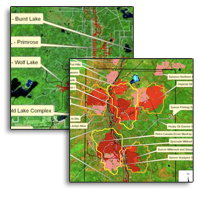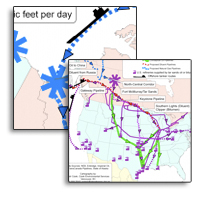Tar Sands 101
The Tar Sands "Gigaproject" is the largest industrial project in human history and likely also the most destructive. The tar sands mining procedure releases at least three times the CO2 emissions as regular oil production and is slated to become the single largest industrial contributor in North America to Climate Change.
The tar sands are already slated to be the cause of up to the second fastest rate of deforestation on the planet behind the Amazon Rainforest Basin. Currently approved projects will see 3 million barrels of tar sands mock crude produced daily by 2018; for each barrel of oil up to as high as five barrels of water are used.
Human health in many communities has seriously taken a turn for the worse with many causes alleged to be from tar sands production. Tar sands production has led to many serious social issues throughout Alberta, from housing crises to the vast expansion of temporary foreign worker programs that racialize and exploit so-called non-citizens. Infrastructure from pipelines to refineries to super tanker oil traffic on the seas crosses the continent in all directions to allthree major oceans and the Gulf of Mexico.
The mock oil produced primarily is consumed in the United States and helps to subsidize continued wars of aggression against other oil producing nations such as Iraq, Venezuela and Iran.
To understand the tar sands in more depth, continue to our Tar Sands 101 reading list
Peak Oil And World Food Supplies
Peak Oil And World Food Supplies
By Peter Goodchild
29 June, 2009
Countercurrents.org
Only about 10 percent of the world’s land surface is arable, whereas the other 90 percent is just rock, sand, or swamp, which can never be made to produce crops, whether we use “high” or “low” technology or something in the middle. In an age with diminishing supplies of oil and other fossil fuels, this 10:90 ratio may be creating two gigantic problems that have been largely ignored.
Mackenzie pipeline timing 'uncertain'
Mackenzie pipeline timing 'uncertain'
Guy Quenneville
Northern News Services
Published Monday, June 29, 2009
SOMBA K'E/YELLOWKNIFE - When the Mackenzie Gas Project will begin producing natural gas - originally thought to be 2014 - is now "uncertain" due to regulatory delays, said Pius Rolheiser, spokesperson for Imperial Oil, adding that the project timeline will be revisited after the release of the Joint Review Panel's report.
Tribal members fight Enbridge [Clipper] oil pipeline
Tribal members fight Enbridge oil pipeline
Some members from Fond du Lac and Leech Lake bands will petition Secretary of State Hillary Clinton to block the Enbridge project.
By: John Myers, Duluth News Tribune
Saying the environmental damage to their native brothers’ land in Canada is too great, tribal dissidents on two Minnesota Indian reservations are battling a major new oil pipeline across northern Minnesota.
Shell To Become Most CO2-Intensive Oil Co -Study
UPDATE: Shell To Become Most CO2-Intensive Oil Co -Study
LONDON (Dow Jones)--Royal Dutch Shell PLC (RDSB.LN) is on track to become the most carbon intensive international oil company because of its focus on unconventional oil resources like Canadian tar sands, said a study published by a coalition of environmental groups Monday.
"In the age of carbon reduction, Shell is fast heading in the opposite direction, massively increasing the carbon intensity of its production of oil and gas," the report said. "This represents a real risk for Shell, for investors and for the climate."
Could tar sands be behind high rates of cancer in Fort Chipewyan?
Could tar sands be behind high rates of cancer in Fort Chipewyan?
By Stephanie Dearing.
Published June 29, 2009
Is the extraction of oil from Alberta's tar sands responsible for the disproportionate increase in cancers in a down-stream community?
A northern Alberta First Nations community, sited down river from the tar sands, is suffering from a higher-than-normal incidence of cancer. Dr. John O'Connor was instrumental in drawing attention to the cancer rate. So why is he seen as a bad guy?
TransCanada gains full ownership of Keystone pipeline
TransCanada gains full ownership of Keystone pipeline
29 June 2009
TransCanada has announced its acquisition of ConocoPhillips' remaining stake in the Keystone pipeline for US$550 million (€392 million), giving it full control over the new Canada-to-US oil pipeline.
The $5.2 billion Keystone line is designed to carry 435,000 barrels of crude a day over a distance of 3,456 km from Alberta, Canada, to refineries in southern Illinois, US.
Cap-and-trade does more harm than good
Cap-and-trade does more harm than good
Bill offers incentives for businesses that pollute.
Jun. 24, 2009 // Philadelphia Inquirer.
By Laurie Williams and Allan Zabel
We would support legislation in Congress to address climate change if it were capable of accomplishing that goal. Unfortunately, despite the best intentions of its proponents, the bill known as Waxman-Markey would disable our ability to reduce greenhouse-gas emissions for at least a decade, hugely increasing the risk of irreversible climate calamity.
BP shuts alternative energy HQ
BP shuts alternative energy HQ
• 'Beyond Petroleum' boast in doubt as clean energy boss quits
• Renewables budget will be reduced by up to £550m this year
Terry Macalister
Guardian.co.uk,
Sunday 28 June 2009
BP has shut down its alternative energy headquarters in London, accepted the resignation of its clean energy boss and imposed budget cuts in moves likely to be seen by environmental critics as further signs of the oil group moving "back to petroleum".
Separating truth from greenwashing in the West's energy export boom
Separating truth from greenwashing in the West's energy export boom
By Andrea Harden-Donahue
| June 24, 2009
Reading the Saskatchewan government's news release announcing the Energy Council conference, I couldn't help but reflect on the connections with the news of a proposed Western Energy Corridor, recently reported in the Star Phoenix following the Western Governors Association (WGA) Annual Conference. While both are riddled with words like 'sustainability' and 'clean energy,' red flags are going up in seeing emerging themes that raise some serious questions.
Group Wants To Stop Planned Pipeline [Enbridge Clipper]
Group Wants To Stop Planned Pipeline
Jun 26, 2009 at 6:14 PM CDT
Some members of the Leech Lake Band of Ojibwe have joined forces with members of the Fond Du Lac band in an effort to stop a planned Enbridge Energy oil pipeline from crossing their reservations.
Spokespeople with the groups say the pipeline will transport dirty oil and they fear a contaminating oil spill.
Enbridge spokespeople say they already have legal agreements with Fond du Lac and Leech Lake tribal councils to allow the Alberta Clipper pipeline to cross reservation land.



